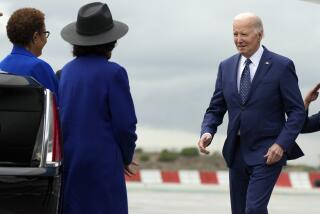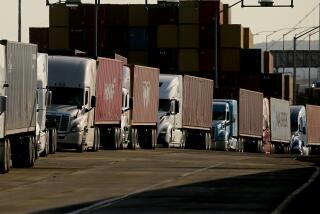Port holes
SIX MEMBERS OF Congress traveled to the Dominican Republic on Sunday for a look at the future of U.S. port security. At Puerto Caucedo, east of Santo Domingo, they examined an X-ray scanning system for cargo containers. The port performing this cutting-edge work is operated by Dubai Ports World.
Yes, that’s the same company that Congress thinks can’t be trusted to run U.S. ports. Earlier this year, Dubai Ports World bought a British firm that operated several ports and cargo terminals in the U.S. Unfortunately for the company, the deal came during an election year when lawmakers were having chest-thumping contests to prove who was tougher on national security. Though Dubai Ports World is headquartered in the United Arab Emirates, one of this country’s strongest Middle Eastern allies, the fact that the UAE is a Muslim country was apparently enough to prove to lawmakers that the deal would make U.S. ports unsafe. Dubai Ports World headed off congressional action by promising to sell its U.S. assets.
On Sunday, insurance giant American International Group agreed to buy the port operations. The lawmakers who spearheaded the xenophobic attacks on Dubai Ports World have since made a lot of self-congratulatory noises, but they have yet to explain why the Dubai company can be trusted to oversee foreign ports where cargo is screened before it’s shipped to the U.S., but not ports in the U.S. itself. Nor is it clear why these U.S. port facilities are better off being owned by a financial services company.
Puerto Caucedo isn’t the only Dubai Ports World facility where new security programs for U.S. cargo are performed. Last week, Homeland Security Secretary Michael Chertoff announced that, starting in February, six foreign ports will scan U.S.-bound cargo for nuclear materials. Of those, only three will scan 100% of U.S.-bound containers, and two of the three are operated by Dubai Ports World.
Ports all over the U.S. are facing a capacity crunch amid a flood of imports, especially from Asia. For East Coast ports -- like the ones just purchased by AIG -- this problem will worsen in the long run after the widening of the Panama Canal. At a time when ports need money to expand, the United States has sent a self-defeating message to foreign port operators that they aren’t welcome to invest here. Three of the four biggest such companies in the world (including Dubai Ports World) are foreign owned.
The best thing about the AIG deal is that it closes the chapter on one of the most embarrassing fits of isolationist hysteria in recent U.S. history. Unfortunately, with a pack of protectionist Democrats about to enter Congress, there could be more bouts of hysteria on the way.
More to Read
Sign up for Essential California
The most important California stories and recommendations in your inbox every morning.
You may occasionally receive promotional content from the Los Angeles Times.










